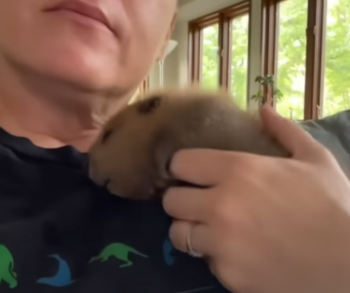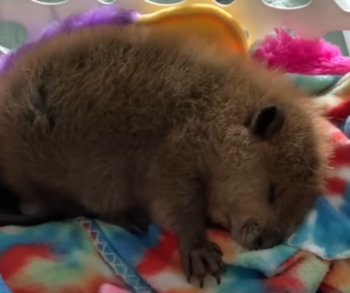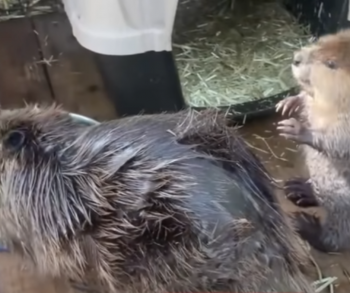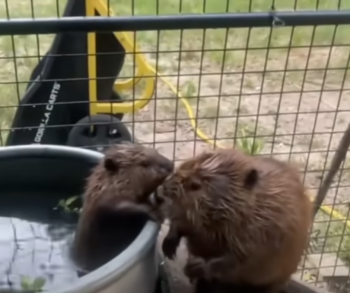A devoted volunteer at Woodside Wildlife Rescue, shares an inspiring tale about Petunia, a baby beaver discovered alone in a field. This heartwarming story illustrates the extraordinary bond that can form between humans and wildlife, shedding light on the essential role of wildlife rescue and rehabilitation. When Petunia was found, she was less than a week old and in dire need of help. Her tiny, fragile body was vulnerable, and without immediate intervention, her chances of survival were slim. Holly’s dedication and compassion played a crucial role in Petunia’s journey to recovery.

Petunia was discovered less than a week old and in desperate need of help. Her tiny, fragile body was vulnerable, and her chances of survival without intervention were slim. The rescue team swiftly brought her in, recognizing the urgency of her situation. Holly, whose main focus at the rescue is caring for beavers, was there to guide Petunia through her challenging journey to recovery.
From the moment Petunia arrived at the rescue, she displayed a feisty and energetic personality that immediately endeared her to everyone. Despite her young age, she showed a surprising level of curiosity and playfulness. She adored playing with plush toys, a behavior that showcased her strong instincts and hinted at the vibrant personality she would grow into.
Living in a puppy kennel, Petunia required constant supervision, as she had a knack for getting into trouble. Her razor-sharp teeth could gnaw through almost anything she found, making her quite the handful when she was awake. Holly had to be vigilant at all times, ensuring that Petunia was safe and that her environment was conducive to her growth and development.
Beavers in rehabilitation, like Petunia, have a natural tendency to move things around, often creating piles or dams inside the house. This instinctive behavior is a testament to their innate skills as builders and engineers of the animal kingdom. For Holly, this meant constantly managing Petunia’s environment to ensure her safety and well-being. She had to strike a delicate balance between allowing Petunia to express her natural behaviors and preventing her from causing any harm to herself or her surroundings.
Despite the challenges, Holly embraced her role as a “beaver mom,” understanding how crucial this care was for Petunia’s mental health and well-being. She recognized that providing Petunia with a nurturing and stimulating environment was essential for her development. Holly’s commitment to Petunia meant that vacations were out of the question. The constant care required for the young beaver was all-consuming, but Holly found immense joy and privilege in being part of Petunia’s life.

Holly’s dedication to Petunia’s care was driven by a deep understanding of the importance of her role. She knew that her efforts were vital in preparing Petunia for a future release back into the wild, a process that can take up to two or three years. Holly’s work was not just about providing immediate care; it was about equipping Petunia with the skills and resilience she would need to thrive independently in the wild.
Petunia wasn’t alone in her journey at Woodside Wildlife Rescue. She had a 1.5-year-old beaver companion named Tulip. Introducing the tiny beaver to an older one was a learning experience for Holly. Initially, Tulip was unsure about Petunia, but over time, the two began forming a positive bond. This companionship was crucial for Petunia’s social development, allowing her to learn and grow under Tulip’s watchful eye.
Petunia spent her nights indoors and her days outside with Tulip, allowing her to learn and grow under Tulip’s watchful eye. This arrangement provided Petunia with the best of both worlds: the security and comfort of an indoor environment during the night and the opportunity to explore and learn from Tulip during the day. Holly carefully monitored their interactions, ensuring that Petunia was safe and that her socialization with Tulip was progressing positively.
At around two months old, determining Petunia’s gender was still uncertain, as beavers are notoriously difficult to sex without an X-ray. Despite this uncertainty, Holly continued to care for Petunia with unwavering dedication. She understood that the bond she was forming with Petunia went beyond simple care; it was about providing a foundation of trust and security that would support Petunia’s development into a healthy and independent beaver.

In Mississippi, beavers are often classified as a nuisance species, but Holly’s work highlights their importance in maintaining healthy ecosystems. Beavers play a crucial role in creating and maintaining wetland habitats, which are essential for a wide variety of plant and animal species. Holly’s efforts at Woodside Wildlife Rescue demonstrate that these animals are not only vital for biodiversity but also for the health of the ecosystems they inhabit.
Beyond her volunteer work, Holly is a University Research Professor who studies the connection between humans and wildlife. Her research underscores the importance of beavers in creating healthier environments. Beavers play a crucial role in protecting humans from floods and fires, making them indispensable in solving many environmental issues. By building dams and creating wetlands, beavers help to regulate water flow, reduce erosion, and create habitats that support a wide range of wildlife.
As Petunia grows, she will eventually be released back into the wild, typically around two years old. The transition back to nature is a crucial part of her rehabilitation, ensuring she can thrive independently. Holly’s joy and sense of privilege in caring for Petunia reflect the dedication and compassion required in wildlife rescue and rehabilitation.
The story of Petunia is not just about a single beaver; it’s about the commitment to preserving wildlife and the ecosystems they support. Holly’s experience as a “beaver mom” at Woodside Wildlife Rescue showcases the profound impact that dedicated care and understanding can have on these remarkable animals. Through her efforts, Petunia and other beavers like her have a chance to grow, thrive, and contribute to the health of our environment, reminding us of the vital connection between humans and the natural world.

As she continues her journey with Petunia, Holly remains committed to educating others about the importance of beavers and the need for wildlife conservation. She uses her platform as a University Research Professor to advocate for the protection and preservation of these essential animals. Holly’s story with Petunia is a beautiful example of how one person’s dedication can change the life of an animal in need. Her commitment not only gives Petunia a second chance but also contributes to a larger understanding of the importance of wildlife conservation.
Holly’s dedication to Petunia and her work at Woodside Wildlife Rescue serves as an inspiration to others. It highlights the importance of compassion, dedication, and understanding in the field of wildlife rehabilitation. By sharing her story, Holly hopes to inspire others to get involved in wildlife conservation and to recognize the vital role that each of us can play in protecting our natural world. Through her efforts, she continues to make a significant impact on the lives of the animals she cares for and on the health of the ecosystems they inhabit.
Holly’s story with Petunia is a testament to the power of love and dedication in the world of wildlife rescue. It’s a reminder that every small action can make a big difference and that by working together, we can create a better future for both animals and humans alike.
Click the video below to watch this incredible story!
Please ‘SHARE’ to pass on this story to a friend or family member
 Toledo, United States.
Toledo, United States.